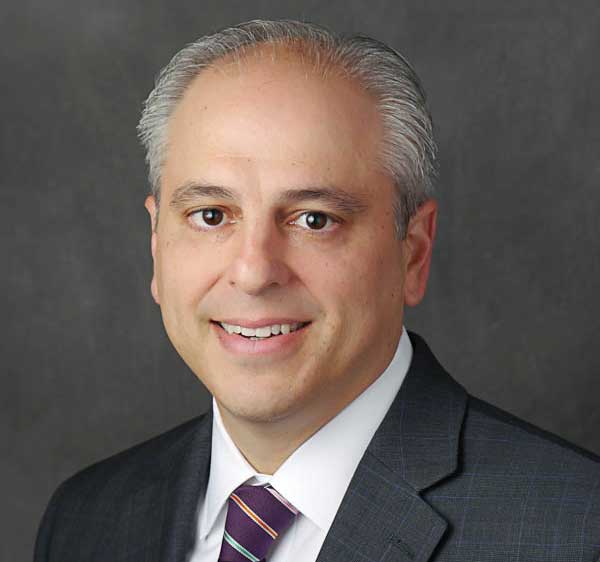<< Back
Dr. Santopietro Brings ‘Servant Leadership’ to Behavioral Health Network

September 17, 2018
Every summer and Christmas vacation from high school through medical school found John Santopietro, MD, DFAPA, donning a rubber apron and working in his family’s fish market, preparing, stocking and selling filets, squid, eel and snails.
The large Italian family that gathered often and talked incessantly was a good breeding ground for the future psychiatrist, who takes over as the first physician-in-chief of the Hartford HealthCare Behavioral Health Network on Oct. 1.
“I’ve always been fascinated by the mind and relationships,” he says, chuckling. “Then, I went for 12 years to a Quaker school where it was all about looking inward. It was inevitable that I would go into mental health.”
A longtime supervisor at the fish market also helped Dr. Santopietro, a Rhode Island native, hone his work ethic and “servant leadership” management style.
“Angelo would never ask you to do something he couldn’t or wouldn’t do himself,” he recalls. “I take pleasure in watching others succeed. If I’m good at anything, it’s putting together great teams that go on to do great things.”
“John has a career-long track record of leadership that promotes and embraces servant-leadership, feedback and quality improvement based on standard work,” says Patricia Rehmer, the Behavioral Health Network president.
Dr. Santopietro, who assumes the vacancy left by Institute of Living Psychiatrist-in-Chief Dr. Harold “Hank” Schwartz, says he is enthusiastic about returning to Hartford and looks forward to continuing a quest to “bring the best care to most people.” His arrival changes the position from a focus on the Institute of Living to the entire Behavioral Health Network president.
“We have extraordinary resources here and this is a great opportunity to leverage those resources across a network to a wide population,” he says of Hartford HealthCare, in a nation that treats only about 40 percent of people with behavioral health issues. Of the many barriers to care, including stigma, he says, “The situation as it stands is not okay. What people don’t generally understand is that we have excellent treatment for mental illness and substance use disorders. If you get somebody into treatment at the right time, 60 to 80 percent will recover.”
Dr. Santopietro returned to Connecticut as president and medical director of Silver Hill Hospital after a stint as chief clinical officer for behavioral health and chair of the Department of Psychiatry at Carolinas HealthCare System where he spearheaded the integration of behavioral health practitioners in 70 primary care practices. He wants to continue that work at Hartford HealthCare.
“The rates of depression and anxiety, the rates of hospitalization and emergency room visits, and patients’ diabetic numbers all went down,” he notes. “Insurers are starting to see that if they pay for behavioral health, physical health improves and the total cost of care for these patients goes down. They can prevent so much downstream cost and suffering.
“Caring both for a person’s physical and behavioral health helps on both sides. The focus needs to be on integration of behavioral health into primary care but also specialties, emergency departments, inpatient and long-term care. Integration with a capital ‘I.’”
People with behavioral health concerns are accessing care today more than before and the stigma is easing slightly, but Dr. Santopietro would like the trend to continue, especially as other concerns heighten. The nation’s suicide rate, for example, is rising, as is the rate of post-traumatic stress syndrome and suicide among military veterans.
“What are we doing to diagnose those who need help? What kind of access do they have? How do we help them reach out?” he says of veterans.
Other aspects of modern life threaten our mental well-being, he continues.
“We’re still learning about the effects of living in the age of terrorism, 24-hour sensational news cycles focused on things people have little control over and social media,” he says. “It will take time, but we’re starting to understand more about how this affects our brains, our relationships and our communities.”
At Hartford HealthCare, Dr. Santopietro says a strong network of facilities – the IOL, Rushford and Natchaug, as well as programs in acute-care hospitals — gives him hope we will be able to bring excellent care to more and more of the community members in need.
“People at HHC have a deep sense of a heritage of treating people like human beings,” he says.
When he joins Rehmer to lead the Behavioral Health Network, Dr. Santopietro will add the perspective of a physician and someone with experience in a variety of systems of care – public and private, large and small, across several geographic and demographic areas. Still, his goal is to breach barriers and deliver care to those who need it.
“The number one need is access,” he says. “If we just got people into the care they deserve, our recovery rates are amazing.”
A graduate of Yale University, Dr. Santopietro earned his medical degree from Northwestern University Medical School, and completed his residency in psychiatry at Cambridge Hospital and a fellowship at the Austen Riggs Center, both in Massachusetts and part of the Harvard system. He has published and lectured extensively, especially on the use of technology to enhance the delivery of behavioral health services.
For more information on the Institute of Living, click here. For more information on the Behavioral Health Network, click here.